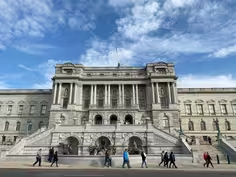
White House appeals ruling suspending abortion pill access
Clip: 4/12/2023 | 6m 50sVideo has Closed Captions
White House asks appeals court to overturn ruling suspending abortion pill access
The recent dueling court rulings on the use of mifepristone ignited a new debate over women's health. The Biden administration has asked an appeals court to overturn the controversial Texas ruling to suspend the FDA's approval of the abortion pill. Jennifer Klein, the director of the White House Gender Policy Council, joined Amna Nawaz to discuss the legal battle.
Problems playing video? | Closed Captioning Feedback
Problems playing video? | Closed Captioning Feedback
Major corporate funding for the PBS News Hour is provided by BDO, BNSF, Consumer Cellular, American Cruise Lines, and Raymond James. Funding for the PBS NewsHour Weekend is provided by...

White House appeals ruling suspending abortion pill access
Clip: 4/12/2023 | 6m 50sVideo has Closed Captions
The recent dueling court rulings on the use of mifepristone ignited a new debate over women's health. The Biden administration has asked an appeals court to overturn the controversial Texas ruling to suspend the FDA's approval of the abortion pill. Jennifer Klein, the director of the White House Gender Policy Council, joined Amna Nawaz to discuss the legal battle.
Problems playing video? | Closed Captioning Feedback
How to Watch PBS News Hour
PBS News Hour is available to stream on pbs.org and the free PBS App, available on iPhone, Apple TV, Android TV, Android smartphones, Amazon Fire TV, Amazon Fire Tablet, Roku, Samsung Smart TV, and Vizio.
Providing Support for PBS.org
Learn Moreabout PBS online sponsorshipAMNA NAWAZ: The recent dueling court decisions on the use of the abortion pill mifepristone have ignited a new debate over women's health.
And, with future access in limbo, some states are stockpiling the medication.
But the Biden administration has asked an appeals court to overturn the controversial Texas ruling to suspend the FDA's approval of the drug.
That decision is expected as early as this week.
Jennifer Klein is the director of the White House Gender Policy Council.
She joins us now.
Jen, welcome back to the "NewsHour," and thanks for joining us.
I want to begin with the administration's announcement today on strengthening privacy protections under HIPAA.
Explain to us what you have been seeing in the anti-abortion movement that says this move was necessary now.
JENNIFER KLEIN, Director, The Gender Policy Council: So, one of the things that we have been seeing is that states are moving to criminalize mostly health care providers.
And what this regulation would do -- today, the Department of Health and Human Services put out a notice of proposed rulemaking.
So there's a chance for comment, and then the rule would ultimately be finalized.
And what that would do is protect sensitive health information under what's called HIPAA -- that's the federal law at issue -- so that while there are exceptions for law enforcement, there would not -- we would narrow that exception for law enforcement for illegal reproductive health care.
So, for example, you have seen women traveling out of state from one state where abortion is banned to another state where it's legal.
And the legal, lawful health care that she got in the state that she traveled to, her health information, the discussion she has with her doctors, the care that she receives in that state where the care is lawful would not be available to law enforcement if -- just when this rule is made final.
AMNA NAWAZ: Jen, this idea was raised a few months ago.
A number of senators sent a letter to President Biden in September of last year, asking him to use HIPAA in this way.
Could this have been done sooner?
JENNIFER KLEIN: Well, initially, the Department of Health and Human Services put out guidance very early on to make clear what the protections are under HIPAA.
And we were waiting to see that, if this continued to happen, and if we saw states passing laws that would criminalize health care, lawful health care, we were ready to take action.
And that's what the Department of Health and Human Services did today.
AMNA NAWAZ: I know we're awaiting the next step from the appeals court when it comes to the Texas judge's ruling on mifepristone.
But there are already some advocates and some Democrats even saying that ruling was unfounded, and the administration should just ignore it.
Do you think you should do that?
JENNIFER KLEIN: Well, you know what?
This case in Texas, this decision in Texas is dangerous.
But the Department of Justice feels that it is also dangerous to ignore a binding legal decision.
But what is really at issue here is that we now have two cases.
We have the case in Texas, which would -- if it stood, would be a nationwide injunction that would prevent mifepristone from being available across the country.
But we also have a case in Washington, which is proceeding.
And, in fact, the Department of Justice filed a motion for clarification to better understand how those two court cases would interact.
So, we're using the courts.
We're confident we -- that we have both the law and the facts on our side and that we will prevail in getting a stay and ultimately succeeding in these cases.
AMNA NAWAZ: If that legal process does not go your way, though, what's the plan?
Could you be stockpiling medication?
Are there other lawsuits you could be filing now?
JENNIFER KLEIN: Several states have begun stockpiling piling medication.
But the governor of Connecticut said it well today.
If the drug is illegal, stockpiling it doesn't actually help.
So, as I said, we are pursuing an aggressive court strategy, and we believe that we will prevail, and that is the answer in this -- in this case.
AMNA NAWAZ: What about misoprostol?
I mean, that's the other drug in this two- drug protocol.
This ruling applies to mifepristone.
Is there anything else you could be doing now to protect future access to misoprostol?
JENNIFER KLEIN: Well, at the moment, this case in Texas does not actually speak to misoprostol.
So, that -- it's really good for your viewers to understand that misoprostol still remains available.
It is -- can be safely used.
AMNA NAWAZ: But, Jen, if I may, are you anticipating that could be challenged as well?
Is there anything you can do to preemptively protect access to it?
JENNIFER KLEIN: There's nothing to do preemptively.
But, again, I think that we don't see any reason for a very legal drug to be challenged in court.
Misoprostol has a lot of uses.
And, again, we have -- we have seen something egregious happen in Texas, so we will be prepared for anything.
But we don't -- we don't see that as a concern, at the moment, anyway.
AMNA NAWAZ: The reason I ask is, it gets to a larger frustration I have heard from some advocates and even some progressive Democrats I speak to, this frustration the administration has moved slowly or not been as creative or aggressive as they'd like to see.
Their argument is, the urgency of this moment requires the administration to meet that moment, that go ahead and get caught trying, in other words.
What would you say to that?
JENNIFER KLEIN: I think we have.
I think this case is as a perfect example of getting caught trying.
We -- the president spoke immediately after the Dobbs decision.
He issued two executive orders to ensure access to abortion, to contraception.
We have made efforts to protect patient privacy.
We're protecting the physical safety and security of patients, health care providers, pharmacies.
This administration has worked quickly and aggressively.
I just this afternoon left on the third meeting of the task force that is designed to bring everyone across the government together.
We heard from the attorney general about the litigation strategy and other things the Department of Justice is doing.
We heard from the secretary of Health and Human Services about this announcement on privacy, but also other things.
The Department of Education is acting, the Department of Defense, the Department of Veterans Affairs.
I think that, really, any insinuation that we have not worked -- acted quickly, decisively and aggressively is just not fair.
AMNA NAWAZ: That is Jennifer Klein, executive director of the White House Gender Policy Council.
Jen, thank you.
Always good to see you.
JENNIFER KLEIN: Thank you.
You too.
Americans get some relief from rising food and gas prices
Video has Closed Captions
Clip: 4/12/2023 | 5m 32s | Americans get relief from rising food and gas prices, but core inflation remains high (5m 32s)
Biden visits Ireland to promote peace, economic growth
Video has Closed Captions
Clip: 4/12/2023 | 9m 2s | Biden visits Ireland to promote peace, push for economic growth (9m 2s)
EPA proposes emissions limits to boost electric vehicle use
Video has Closed Captions
Clip: 4/12/2023 | 6m 15s | EPA proposes strict limits on tailpipe emissions to speed up electric vehicle transition (6m 15s)
'Imagine' among 25 additions to National Recording Registry
Video has Closed Captions
Clip: 4/12/2023 | 3m 21s | 'All I Want for Christmas is You' among 25 additions to National Recording Registry (3m 21s)
Local public health efforts politicized in wake of pandemic
Video has Closed Captions
Clip: 4/12/2023 | 9m 1s | Rural healthcare access at risk as public health efforts become politicized (9m 1s)
Report shows efforts to sow division after Trump indictment
Video has Closed Captions
Clip: 4/12/2023 | 7m 34s | Analysis shows Russian and Chinese-backed efforts to sow division after Trump indictment (7m 34s)
Providing Support for PBS.org
Learn Moreabout PBS online sponsorship
- News and Public Affairs

FRONTLINE is investigative journalism that questions, explains and changes our world.

- News and Public Affairs

Amanpour and Company features conversations with leaders and decision makers.












Support for PBS provided by:
Major corporate funding for the PBS News Hour is provided by BDO, BNSF, Consumer Cellular, American Cruise Lines, and Raymond James. Funding for the PBS NewsHour Weekend is provided by...





